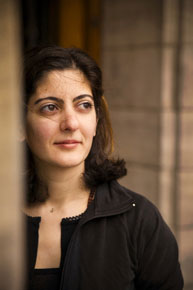Profile - Lina Kalfayan: No choice but to have an impact
Profile - Lina Kalfayan: No choice but to have an impact McGill University
User Tools (skip):
Profile
Lina Kalfayan: No choice but to have an impact
She may have won a Canada Corps internship, received the Forces AVENIR award and made the upcoming list of L'Actualité magazine's top-30 most socially engaged individuals, but Lina Kalfayan doesn't care whether you know it or not. In fact, if her staunch modesty had its way, you'd know very little about the doctoral student in immunology save the one project she just can't keep quiet about: her mission to get as many McGill students as possible experiencing humanitarian aid efforts abroad.

For immunology student Lina Kalfayan, all it takes to succeed in an international internship is the willingness to try. "It's important to remember that your skills are transferable, no matter what you're studying," she says. For more on her project, visit www.ruralrejuvenation.org.
Claudio Calligaris
When Kalfayan moved to Montreal from Lebanon in 1999, she had a different set of clear-cut plans: complete a PhD, get work experience, start her career. Now on the verge of completing her thesis, she barely recognizes the single-minded go-getter she once was.
"There is almost nothing left of the person I used to be before," she confesses. "I used to think only in terms of 'What's next?' Now I know I'll do anything and everything as long as it helps others."
Kalfayan's epiphany, that moment when she discovered a new purpose outside herself, happened when the South Asian tsunamis struck in 2004. A child of the Lebanese Civil War, she grew up used to feeling powerless in the face of others' vulnerability. Now able to take action, she couldn't sit idly by. She called a few classmates, grabbed some lab coats and headed to the local Zellers to fundraise for tsunami rehabilitation on behalf of McGill's science community. By March 2005, she was on a plane to South India, about to devote her five weeks of vacation time to the Isha Foundation, a non-profit organization specializing in the development of over 5,000 Indian villages.
Trekking through the state of Tamil Nadu in trucks converted into mobile health clinics, Kalfayan was quickly enchanted by the foundation's holistic approach to helping villagers improve their own lives by using locally relevant resources like yoga and herbal gardens. Though her main duty was to generate reports and press releases about Isha's ongoing projects, Kalfayan couldn't help but get involved in the village activities. "You can't just do data work when someone next to you is planting trees and building schools," she says.
To her surprise, when it came time for goodbye, Kalfayan realized she had gained more than she had given: "I knew I had to go back."
The next semester, by happy coincidence, she received a department email advertising internship opportunities with Canada Corps, a program that encourages students to initiate governance projects in developing countries. Aware of the Isha Foundation's influence in rural India, the researcher in her started thinking: what could she do to help the organization evolve? Her winning proposal: create a database of Isha's Action for Rural Rejuvenation program in order to track disease trends across villages and evaluate the outcome of volunteer activities.
"The responsibility was mine," she says. Weeks later, Kalfayan was en route to India.
During her four-month internship, Kalfayan gained a true appreciation for Isha's methods. "It's not about taking an underdeveloped area and trying to make it like a developed country — that doesn't work," she says. "You must have a deep local understanding of the people's cultural, spiritual and health needs if you want your project to have a real impact."
Working 20-hour days and relying on the powers of yoga to stay level-headed, Kalfayan admits she was unexpectedly humbled by the sheer determination of Isha's volunteers. "Somehow, they dragged me into their schedule and I had no idea how I was functioning," she says, laughing. "But I realized the moment you're doing something for another person, the hours don't matter."
Clearly, Kalfayan was utterly transformed by her experience. Yet with her genuine smile, she comes across not as a preacher but as an ambassador of goodwill, urging students to expand their worlds beyond the pages of a university course calendar.
"The experience touches you in such a way... you just can't keep it to yourself," she says of her new role as youth speaker for the Canadian International Development Agency. "It's true that misery exists in these countries; it's true that people are poor, but they have such dignity. When you finally realize you're capable of making a difference in their lives, it's no longer about choice. You do it."
Want to learn more about international internships? For information about the Canada Corps University Partnership Program, visit www.mcgill.ca/deanofstudents/recognition. For details on Forces AVENIR grants — awarded to students who show a commitment to advancing society through project-based initiatives — visit www.forcesavenir.qc.ca. For a list of university internships, visit www.mcgill.ca/arts-internships/.

